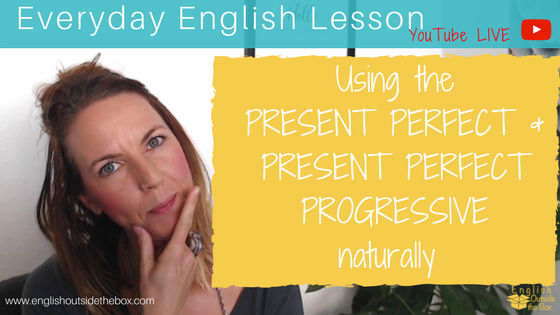
How to Use the Present Perfect and Present Perfect Progressive Naturally in English
If you feel confused by the present perfect tense, then don’t worry you’re not alone! This time tense and the present perfect progressive are the grammar points I receive the most questions about! However, they are commonly used in English and luckily there are tips and tricks you can learn so you know how to use them, too! Today’s Everyday English lesson will help you understand how to use the present perfect and the present perfect progressive tense more naturally in English by….
- listening to me use them naturally in a conversation
- learning why I used them when I explain the rules and structure
Let’s start with the video lesson, where you can hear me use a variety of verbs and sentence examples. Get the full lesson notes and practice exercises, below!
How to Use the Present Perfect and Present Perfect Progressive Naturally in English
As I told you before, these tenses can be quite confusing. So, below, we have some examples describing what I have been doing lately and the corresponding explanation.
- Non-Action Verbs
I’ve been so busy [the main verb is to be] creating material for my podcast.
As you know, the verb to be is a stative verb, a non-action verb. These verbs cannot be in the progressive form. Which means they cannot be in the -ING form.
So, that is why we use stative verbs in the Present Perfect tense.
***Remember: The action started in the past and it’s still continuing now. But it can’t be in the ING-form because it’s a stative verb.
- Action Verbs
We also have action verbs connecting a past action to the present.
In this case, we use the Present Perfect Progressive tense.
I’ve been creating content for my fluency training program, The Conversation Club.
We’ve been adjusting to the time change.
We have been trying to help him sleep on a more consistent basis.
***Notice: both Present Perfect and Present Perfect Progressive can’t have any time expression. So, if you want to know how to use the present perfect and how to use it naturally you cannot make this mistake.
My family and I have been adjusting to the time change last week.
For and Since are the only way you can use a time expression in the present perfect or the present perfect progressive.
My family and I have been adjusting to the time change for the past 8 days.
My family and I have been adjusting to the time change since November 5th.
To use a time expression, other than For and Since, you have to use the simple past.
My baby went to sleep 30 minutes ago.
The time changed on November 5th.
- Actions recently done or completed
Another important piece of information you need if you are learning how to use the present perfect is that you can use this tense to talk about an action that has recently been done or completed.
The time has recently changed. It changed on November 15th.
I’ve just put him down for a nap so he is sleeping now.
Moreover, “just” and “recently” are keywords to say that the action was recently done or completed. So, make sure to use them to express yourself naturally.
Practice Makes Perfect
Show your support AND practice your English by commenting on the YouTube video with sentences to practice the rules we learned here today!
Can you write your own sentence examples for the following:
- Using a stative verb about an action that started in the past and is still continuing today
- Using an action verb about something that started in the past and is still continuing today
- About an action that has just or recently finished (using one or both of these keywords)
Good luck and until next time,
Happy Studying! ♥
The best way to continue learning more natural English is with me in the Conversation Club. Learn more phrasal verbs, expressions, and improve your communication skills every week with me in this online fluency training program. Sign up to learn more here:
The Conversation Club will provide you with 6 group conversation calls to practice with a real teacher and a group message community to connect with other members.
You will also get weekly English lessons to help your vocabulary, listening, reading, pronunciation, and more!
Try the Club for 1 week, free! Join the 1-week free trial here.
